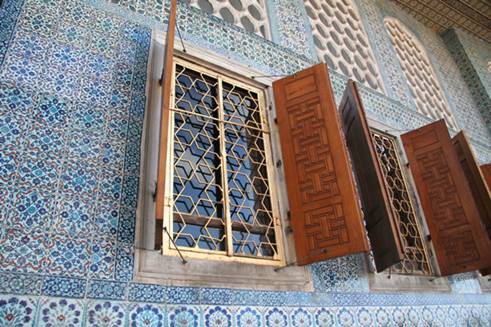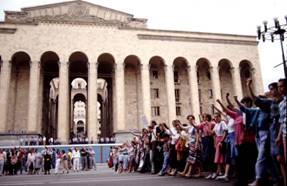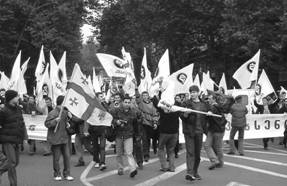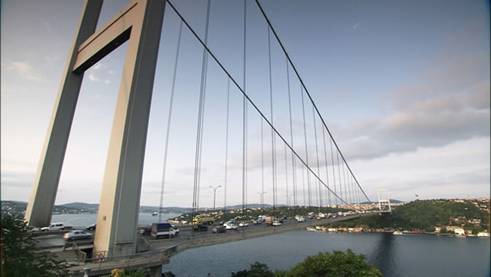ESI recommended books and films on South East Europe
Most links (highlighted in bold) in this newsletter refer to an earlier version of this website which is no longer maintained
Dear friends of ESI,
In our first newsletter in 2009 we would like to draw your attention to a recently expanded section on our website: the ESI literary walk (supported by the Viennese ERSTE Foundation).
Our aim is to offer you a familiar experience, but online: you visit a friend and soon find yourself spending an hour in front of her shelf, making a list of all the interesting books which you might want to get.
Our aim is to present some of the most fascinating books (with short excerpts) on South East Europe, here defined as reaching from Tirana to Baku, from the Adriatic to the Caspian.
 |
|
Harem windows in Topkapi palace in Istanbul |
Are you interested in the impact of the Great Depression in 1929 on Balkan economies, now that a new global economic crisis is casting its dark shadow on the region? Wondering why a young Montenegrin was bringing eggs to Italian women in wartime Cetinje? Interested in Misha Glenny's captivating recent book on organized crime, and what it means for the Balkans? Curious to read from Charles King on the Black Sea, Neil Ascherson on the conflict in Abhkazia or Garth Cartwright on Ferus King and other Balkan Gypsy musicians?
Some books, like Mark Mazower's book on the Balkans, are essential reading. Here Mazower explains the novelty of the concept "Balkans":
"At the end of the twentieth century, people spoke as if the Balkans had existed forever. Two hundred years earlier, they had not yet come into being. It was not the Balkans but "Rumeli" that the Ottoman's ruled, the formerly "Roman lands" that they had conquered from Byzantium. The Sultan's educated Christian Orthodox subjects referred to themselves as "Romans" ("Romaioi"), or more simply as "Christians". To Westerners, familiar with classical regional terms such as Macedonia, Epirus, Dacia and Moesia, the term "Balkan" conveyed little."
We hope you will find something of interest in this walk through a landscape of books. If you have your own suggestions for books to include and recommend, please let us know as well.
 |
 |
|
Protest in Georgia 1989. © Peter Nasmyth |
Protest in Georgia 2003. © Peter Nasmyth |
Captivating Georgia
In 2009 developments in the South Caucasus, including Georgia, are going to be a central focus of ESI's work.
Recently we put Georgian portraits on our website's portraits section (many more to follow): Alexander Rondeli, one of the leading political analysts in the country, Lela Babutsidze, a refugee from South Ossetia; Soso Mtskeradze, a native of Gori who used to work for the OSCE, and Tamar Beruchashvili, Deputy State Minister for European Integration, who told us late last year that
"Now, after the [August 2008] crisis, Georgia has a unique opportunity to come closer to the EU. I am very happy to see Europe active and finally understanding that Georgia is part of Europe, and not just part of the neighbourhood. It is European in terms of values and security. I don't believe Georgia will be abandoned."
We also added a new ESI Picture Story on Georgia. It is based on a fascinating account of the country written by Peter Nasmyth, a British writer, publisher and one of the founders of the best international bookshop/cafe in Tbilisi, Prospero's. As he told us in Tbilisi last October:
"I have a genuine affection for Georgia. I am not cynical about the country and this I think helps the understanding. Georgia is not like us (the West) with a desire to be all neat and regulated. Neither is it a shining example of political stability. It is a country proud of its emotional originality and contrariness."
Nasmyth's journey to Georgia started in Russia – on one of his trips to Moscow in the late 1980s, when he heared about Georgia, whose "Soviet colonisation had been preceded by the Russians, the Turks, the Arabs, the Persians, the Byzantines, the Mongols, the Romans, the Greeks. Those people regarded their current masters as just another landlord in a long succession."
Coming to Tbilisi he describes the chaos in Tbilisi in the early 1990s:
"Many buildings on the glorious late 19th and 20th century Rustaveli Avenue lay roofless and smouldering. But there were other gaps too. The Avenue itself was virtually empty and a petrol shortage had reduced traffic by two thirds. Many citizens now locked away their cars as too much trouble, no petrol, street theft, hijacking, vandalism. Guns were now everyday objects and prices kept falling."
Tbilisi by day was a depressing sight at this time, but the night revealed a yet more worrisome residue from the war. Many ordinary people were now armed and gunfire was common. Militias, like the infamous Mkhedrioni ("horsemen"), who helped to bring down the Gamaskhurdia government, ruled the streets and proved powerful political actors."
In 2003 Nasmyth visited the newly renovated Marriott Tbilisi Hotel on the eve of the Rose revolution. It had been destroyed during the civil war and stood as a burnt out shell for 8 years. Parliamentary elections were just ahead and eleven years of free-market economy and the economic growth of the last years had not translated into development for all:
"During these years the country had polarised to create a few very rich and many more poor than before. Villas sprouted from the ground in Tskneti – Tbilisi's Beverly Hills – like gaudy mushrooms, while beggars and street children appeared on Rustaveli Avenue. Corruption blossomed again like a huge fungus within institutions… How much longer would the emotion-charged Georgian personality tolerate it? Because with every loudly proclaimed step of public progress – like the new Baku-Tbilisi-Ceyhan oil pipeline; an adjustment in the legislature; a restored building – came an invisible backwards step behind the scenes. Still the power-cuts regularly blackened sections of the city in winter; still Georgian custom and tax department extorted money from businesses; still pensions and state salaries weren't paid. People's patience was running low."
For more on Georgia and Nasmyths book please visit the latest ESI picture story on our website.
 |
|
Equestrian Statue of Alexander the Great in Thessaloniki |
ESI event on Greece and Turkey in Istanbul (31 January)
Our efforts to present the results of the Return to Europe film series to a broad audience across Europe continue as well. In recent weeks we showed films in Pristina, in Budapest and in Tbilisi.
If you are interested in seeing some of these films you can now do so this coming week in Brussels and Istanbul.
On Saturday 31 January we are going to show three films on one day in Istanbul: Istanbul: Truth, fear and hope, Greece – Alexander's Shadow, and, for the first time in Turkey, Tassos Boulmetis' award-winning film A Touch of Spice, a poetic film based on his own story of a Greek child and his family being expelled from Istanbul in the 1960s.
The event will take place from 16:00 at Bilgi University's Santral Campus.
We are also organising two panels on Greece and Turkey including, among others, Takis Michas, Eleftherotypia, Athens, Murat Belge, Bilgi University, Taraf, Kai Strittmatter, Süddeutsche Zeitung and Perihan Magden, author, Radikal.
To find out more about the Istanbul event, and how to register to take part, please visit our website.
 |
|
The Bosporus |
ESI and EPC events on Serbia and Turkey in Brussels (26-27 January)
ESI will also be very active in Brussels next week. Two or our films will be shown at the cinema of the European Commission for Commission staff, and two screened at joint events with the European Policy Centre (EPC):
- Serbia film: Exit Europe, Monday 26 January, 16:30
- Turkey film: Istanbul – Truth, Fear and Hope, Tuesday, 27 January, 14:30 - 16:30
The Serbia screening will be followed by a panel discussion including Hedvig Morvai-Horvath, Director of the Belgrade based European Fund for the Balkans, Milica Delevic, Head of the EU integration office in Belgrade, Dejan Anastasijevic, journalist for Serbian newspaper Vreme, Gerald Knaus, ESI Chairman, and Srdjan Cvijic, External Adviser to the European Policy Centre (EPC). The Dialogue will be chaired by Rosa Balfour, EPC Senior Policy Analyst.
The Turkey screening will be followed by a panel discussion, including Nigar Göksel, Editor of Turkish Policy Quarterly and ESI Senior Analyst, Soli Özel, Istanbul Bilgi University and Columnist of Turkish Daily Sabah, Heather Grabbe, Member of the Cabinet of Olli Rehn, and Gerald Knaus, Chairman of the ESI. The dialogue will be chaired by Antonio Missiroli, EPC Director of Studies.
Hoping to see some of you at either of these events.
Many best wishes,
![]()
Gerald Knaus
P.S.: If you happen to be in Austria in the coming weeks you can also see three of the films in the Return to Europe series on ORF2:
- Bulgaria, 25 January, 23:00
- Greece, 1 February, 23:00
- Turkey, 8 February, 23:00

Gerald Knaus
